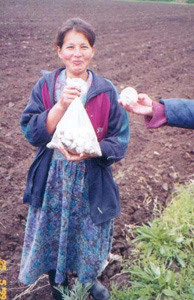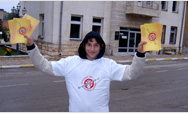You are here » Home » Telling Our Story
Photo & Caption
USAID helps orphanage produce 2.3 tons of vegetables and earn $3,300 in revenues
Learning To Farm In Kazakhstan

Photo: Craig VanDevelde
Orphan shows off onion harvest which was produced with the help of USAID’s Farmer to Farmer volunteer Dave Pearce. When Orphanage #3 in Almaty, Kazakhstan saw its funding levels cut year after year in the 1990’s, it decided to get entrepreneurial. A state-supported orphanage with 300 children, Orphanage #3 decided that some kind of small business activity was its best chance to support the rising costs of raising and educating its children. With six hectares of land donated from the local government and over $14,000 worth of cash and materials (seed and equipment) donated by private companies, the orphanage was on its way to launch a productive greenhouse initiative - it just needed help getting started.
Through USAID’s Farmer to Farmer program, working with Winrock International, volunteer Dave Pearce of North Dakota worked with the orphans as well as local university students to establish a direct farm marketing operation. Over the course of several assignments, Pearce and other Farmer to Farmer volunteers taught the children how to draw up a field plan for their operation, prepare the land for planting, monitor the soil for proper nutrient levels, construct and maintain a greenhouse and drip irrigation system, and transport and market the produce.
Prior to Pearce’s arrival in Kazakhstan, the children had no experience growing or marketing vegetables. Through Pearce’s hands-on approach, the children developed capabilities both in farm management and marketing. The orphanage produced 2.3 tons of vegetables in its first season of operation, and earned nearly $3,300 in revenue. As word got out about the orphanage’s activities, demand grew and a produce truck began traveling different routes throughout the capital city to delver produce to customers including restaurants and staff at foreign embassies.
Print-friendly version of this page (244kb - PDF)
Back to Top ^
|




